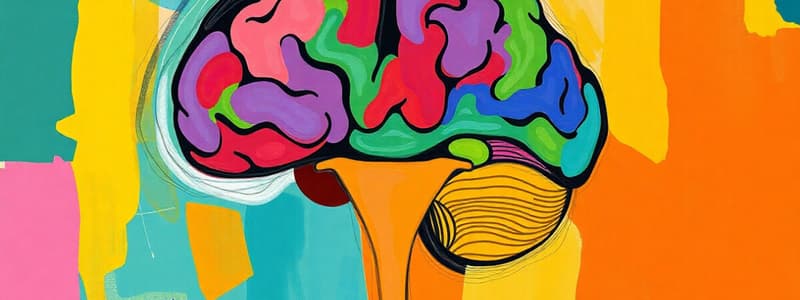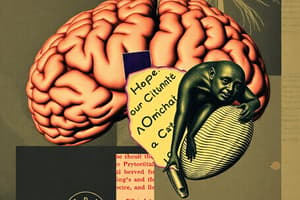Podcast
Questions and Answers
What role does melatonin play in the body?
What role does melatonin play in the body?
Melatonin contributes to the setting of the body's biological clock and promotes sleepiness, particularly by increasing levels during darkness.
How does the thymus affect the immune system?
How does the thymus affect the immune system?
The thymus produces hormones that promote the maturation of T cells, which are crucial for destroying microbes and foreign substances.
Where is the pineal gland located, and what is its primary function?
Where is the pineal gland located, and what is its primary function?
The pineal gland is located attached to the roof of the third ventricle of the brain and primarily secretes melatonin to help regulate sleep-wake cycles.
What changes occur in female bodies during puberty due to hormonal influence?
What changes occur in female bodies during puberty due to hormonal influence?
What anatomical features protect the pineal gland?
What anatomical features protect the pineal gland?
What effect do thymus hormones have beyond T cell maturation?
What effect do thymus hormones have beyond T cell maturation?
What is the primary role of the pituitary gland in the endocrine system?
What is the primary role of the pituitary gland in the endocrine system?
How do the nervous and endocrine systems interact?
How do the nervous and endocrine systems interact?
Identify the two portions of the infundibular stalk.
Identify the two portions of the infundibular stalk.
What hormones are synthesized by the hypothalamus?
What hormones are synthesized by the hypothalamus?
Describe the composition and function of the anterior pituitary.
Describe the composition and function of the anterior pituitary.
What happens to the pars intermedia during human fetal development?
What happens to the pars intermedia during human fetal development?
What is the role of somatotrophic cells in the anterior pituitary?
What is the role of somatotrophic cells in the anterior pituitary?
Where is the pituitary gland located?
Where is the pituitary gland located?
What is the function of the posterior pituitary?
What is the function of the posterior pituitary?
What triggers the release of oxytocin during delivery?
What triggers the release of oxytocin during delivery?
What physiological effect does oxytocin have after delivery?
What physiological effect does oxytocin have after delivery?
What is the primary function of antidiuretic hormone (ADH)?
What is the primary function of antidiuretic hormone (ADH)?
What happens to urine output in the absence of ADH?
What happens to urine output in the absence of ADH?
Describe the structural characteristics of the thyroid gland.
Describe the structural characteristics of the thyroid gland.
What is the approximate normal mass of the thyroid gland?
What is the approximate normal mass of the thyroid gland?
What role does alcohol play in urine production regarding ADH?
What role does alcohol play in urine production regarding ADH?
What may oxytocin be responsible for in males and non-pregnant females?
What may oxytocin be responsible for in males and non-pregnant females?
What anatomical features define the lobes of the thyroid gland?
What anatomical features define the lobes of the thyroid gland?
What are thyroid follicles?
What are thyroid follicles?
What is the primary function of the suprarenal medulla?
What is the primary function of the suprarenal medulla?
Which hormones are predominantly released by the chromaffin cells of the suprarenal medulla?
Which hormones are predominantly released by the chromaffin cells of the suprarenal medulla?
Describe the structure of the pancreas.
Describe the structure of the pancreas.
What are pancreatic acini and what is their function?
What are pancreatic acini and what is their function?
How many types of hormone-secreting cells are present in the pancreatic islets?
How many types of hormone-secreting cells are present in the pancreatic islets?
What hormone is secreted by the alpha cells of the pancreatic islets?
What hormone is secreted by the alpha cells of the pancreatic islets?
What role do beta cells play in the pancreas?
What role do beta cells play in the pancreas?
What is the function of somatostatin secreted by delta cells?
What is the function of somatostatin secreted by delta cells?
What percentage of the pancreatic islet cells do beta cells constitute?
What percentage of the pancreatic islet cells do beta cells constitute?
What is unique about the location of the pancreas?
What is unique about the location of the pancreas?
What are the primary cells that form the wall of each thyroid follicle?
What are the primary cells that form the wall of each thyroid follicle?
How do T thyrocytes change under the influence of TSH?
How do T thyrocytes change under the influence of TSH?
What two hormones are produced by T thyrocytes?
What two hormones are produced by T thyrocytes?
What is the function of the basement membrane surrounding each thyroid follicle?
What is the function of the basement membrane surrounding each thyroid follicle?
How do thyroid hormones affect the nervous system?
How do thyroid hormones affect the nervous system?
What role do thyroid hormones play in the growth of the skeletal system?
What role do thyroid hormones play in the growth of the skeletal system?
What effect does alcohol have on the body's hydration levels?
What effect does alcohol have on the body's hydration levels?
How do T3 and T4 together function in the body?
How do T3 and T4 together function in the body?
What is the significance of thyroglobulin produced by T thyrocytes?
What is the significance of thyroglobulin produced by T thyrocytes?
What is the primary contribution of parafollicular cells (C thyrocytes) in the thyroid?
What is the primary contribution of parafollicular cells (C thyrocytes) in the thyroid?
Flashcards are hidden until you start studying
Study Notes
Endocrine System
- Responsible for regulating all types of body cells
- Works in conjunction with the nervous system as an interlocking "supersystem"
Hypothalamus and Pituitary Gland
- Hypothalamus is the “master” of the pituitary gland
- Pituitary gland is considered the “master” endocrine gland
- Hypothalamus regulates virtually all aspects of growth, development, metabolism, and homeostasis
- Pituitary gland is pea-shaped, measuring 1-1.5 cm in diameter
- Infundibular stalk attaches the pituitary gland to the hypothalamus
- Pituitary gland has two separate regions:
- Anterior Pituitary (adenohypophysis) - composed of epithelial tissue
- Posterior Pituitary (neurohypophysis) - composed of neural tissue
Anterior Pituitary
- Composed of three regions:
- Pars distalis - larger portion
- Pars tuberalis - forms a sheath around the infundibular stalk
- Pars intermedia - atrophies during human fetal development
- Secretes hormones that regulate wide-ranging bodily functions, including growth and reproduction.
- Cells within the anterior pituitary secrete various hormones:
- Somatotropic cells: secrete growth hormone (GH)/somatotropin
- GH stimulates overall body growth and influences metabolism
Posterior Pituitary
- Composed of two regions:
- Pars nervosa - the larger bulbar portion
- Infundibular stalk
- Secretes hormones:
- Oxytocin (OT):
- Primarily targets uterine smooth muscle and mammary glands in females:
- During delivery, stretching of the cervix stimulates oxytocin, increasing uterine contractions.
- After delivery, oxytocin stimulates milk ejection from the mammary glands in response to suckling.
- Function in males and non-pregnant females is not fully understood.
- Primarily targets uterine smooth muscle and mammary glands in females:
- Antidiuretic Hormone (ADH)/Vasopressin:
- Causes the kidneys to conserve water in the blood, reducing urine volume.
- Absence of ADH leads to significant increase in urine output (up to 10 times the normal volume).
- Alcohol inhibits ADH secretion, causing increased urination (hydration and hangover effects).
- ADH also reduces water loss through sweating and constricts arterioles to increase blood pressure.
- Oxytocin (OT):
Thyroid Gland
- Butterfly-shaped gland located inferior to the larynx
- Composed of two lobes (right and left) connected by an isthmus anterior to the trachea.
- May possess a small third lobe (pyramidal lobe).
- Normal thyroid mass is about 30 g (1 oz).
- Thyroid follicles: microscopic spherical sacs composing the thyroid gland.
- Walls primarily consist of follicular cells; most extend into the lumen of the follicle.
- Follicular cells produce two hormones:
- Thyroxine/tetraiodothyronine (T4): contains four iodine atoms.
- Triiodothyronine (T3): contains three iodine atoms.
- T4 and T3 are collectively known as Thyroid Hormones.
- Follicular cells also produce Thyroglobulin.
- Parafollicular cells: secrete calcitonin, which plays a vital role in calcium homeostasis.
Thyroid Hormone Effects
- Regulate metabolism: increase basal metabolic rate, heart rate, and blood pressure.
- Affect development and growth of nervous tissue and bones:
- Promote synapse formation, myelin production, and dendrite growth in the nervous system.
- Contribute to ossification centers in developing bones, bone protein synthesis, and secretion of growth hormone (GH) and insulin-like growth factors (IGFs).
Suprarenal Medulla
- Inner region of the suprarenal gland, a modified sympathetic ganglion of the autonomic nervous system (ANS).
- Chromaffin cells: hormone-producing cells innervated by sympathetic preganglionic neurons of the ANS.
- Secrete catecholamines:
- Norepinephrine/adrenaline/noradrenaline (80%)
- Epinephrine (20%)
- Catecholamines intensify sympathetic responses in other parts of the body.
Pancreas
- Both endocrine and exocrine gland
- Flattened organ measuring about 12.5-15 cm (5-6 in.) long, located in the curve of the duodenum
- Consists of a head, body, and tail
- Pancreatic acini: clusters of exocrine cells, comprising roughly 99% of pancreatic cells.
- Produce digestive enzymes, which flow into the digestive canal via a network of ducts.
- Pancreatic islets/islets of Langerhans: tiny clusters of endocrine cells scattered among pancreatic acini.
- Contain four types of hormone-secreting cells:
- Alpha/A cells: constitute 17% of islet cells, secrete glucagon
- Beta/B cells: constitute 70% of islet cells, secrete insulin
- Delta/D cells: constitute 7% of islet cells, secrete somatostatin
- F cells: secrete pancreatic polypeptide.
- Contain four types of hormone-secreting cells:
Pineal Gland
- Small endocrine gland attached to the roof of the third ventricle of the brain.
- Part of the epithalamus, positioned between the superior colliculi.
- Mass of 0.1-0.2 g, covered by a capsule formed by the pia mater.
- Contains masses of neuroglia and secretory cells called pinealocytes.
- Secretes melatonin: an amine hormone derived from serotonin.
- Contributes to setting the body's biological clock (controlled by the suprachiasmatic nucleus of the hypothalamus).
- Increased melatonin release during darkness promotes sleepiness.
Thymus
- Located behind the sternum, between the lungs
- Produces thymosin, thymic humoral factor (THF), thymic factor (TF), and thymopoietin.
- These hormones promote maturation of T cells (a type of white blood cell that destroys microbes and foreign substances).
- May slow down the aging process.
Studying That Suits You
Use AI to generate personalized quizzes and flashcards to suit your learning preferences.




